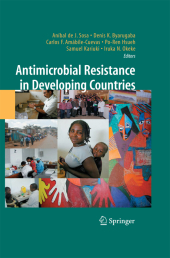 Neuerscheinungen 2014Stand: 2020-02-01 |
Schnellsuche
ISBN/Stichwort/Autor
|
Herderstraße 10
10625 Berlin
Tel.: 030 315 714 16
Fax 030 315 714 14
info@buchspektrum.de |

Carlos Amabile, Denis K. Byarugaba, Po-Ren Hsueh, Samuel Kariuki, Iruka N. Okeke, Aníbal de J. Sosa
(Beteiligte)
Antimicrobial Resistance in Developing Countries
Herausgegeben von Sosa, Aníbal de J.; Byarugaba, Denis K.; Amabile, Carlos; Hsueh, Po-Ren; Kariuki, Samuel
2010. 2014. xxiii, 554 S. 39 Tabellen. 235 mm
Verlag/Jahr: SPRINGER, BERLIN; SPRINGER NEW YORK; SPRINGER 2014
ISBN: 1-489-98425-9 (1489984259)
Neue ISBN: 978-1-489-98425-8 (9781489984258)
Preis und Lieferzeit: Bitte klicken
Here is a compilation of data on the problem of antimicrobial resistance in developing countries, addressing general global perspectives, risk factors, current rates, trends, and possibilities for containment relating to specific conditions in those countries.
Avoiding infection has always been expensive. Some human populations escaped tropical infections by migrating into cold climates but then had to procure fuel, warm clothing, durable housing, and crops from a short growing season. Waterborne infections were averted by owning your own well or supporting a community reservoir. Everyone got vaccines in rich countries, while people in others got them later if at all. Antimicrobial agents seemed at first to be an exception. They did not need to be delivered through a cold chain and to everyone, as vaccines did. They had to be given only to infected patients and often then as relatively cheap injectables or pills off a shelf for only a few days to get astonishing cures. Antimicrobials not only were better than most other innovations but also reached more of the world´s people sooner. The problem appeared later. After each new antimicrobial became widely used, genes expressing resistance to it began to emerge and spread through bacterial populations. Patients infected with bacteria expressing such resistance genes then failed treatment and remained infected or died. Growing resistance to antimicrobial agents began to take away more and more of the cures that the agents had brought.
Aus den Rezensionen: "... In dem Buch werden von insgesamt 30 Autorinnen (Mikrobiologen und Infektiologen) in hervorragenden Übersichtsartikeln all die genannten Probleme dargestellt. Die Literaturangaben sind auf dem neuesten Stand. Für alle die sich mit Infektionserkränkungen hier und in armen Ländern beschäftigen ist das Buch ein Muss und kann uneingeschränkt empfohlen werden." (Dr Gerhard Schwarzkopf-Steinhäuser, in: Pharma-Brief, May/June/2010, Issue 4-5, S. 4 f.)


